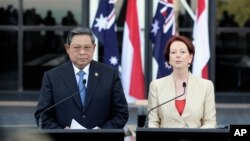SYDNEY — Australia and Indonesia have agreed to strengthen maritime ties in an effort to combat people smuggling, after two boats carrying asylum seekers capsized and left dozens dead in the past two weeks.
Asylum seekers and the trafficking gangs that transport them by boat from Indonesia have dominated talks between Australia and its northern neighbor.
A steady flow of unauthorized arrivals, about 4,000 this year, have been intercepted in Australian waters. There have been two emergencies in recent weeks. Dozens of passengers died when their vessel sank last month near Australia’s Indian Ocean territory Christmas Island. A few days later another boat capsized and most of those onboard rescued.
The leaders of Indonesia and Australia have agreed to work more closely to avoid similar accidents in the future. Maritime search and rescue agencies from both nations are to have closer ties.
Australian Prime Minister Julia Gillard says immigration is one of a number of key issues being discussed.
“Terrorism and drugs, people smuggling, natural disasters management; threats as difficult as any in our shared history. It is a remarkable tribute to the relationship between our nations that now, when we are faced by these hard issues, we turn towards each other rather than turning away,” she said.
Economic and trade issues are also being addressed during the talks in Darwin, the capital of Australia's Northern Territory.
Canberra is being urged to take the bilateral relationship more seriously. Australian National University Strategic Studies professor Hugh White says Indonesia will be a superpower within decades and could be either an important ally for Australia or a dangerous rival.
“Some projections see Indonesia within a few decades as the fourth-biggest economy in the world, even more conservative projections see it with an economy two or three times the size of Australia's within 20 or 30 years, which is not very far away. So we need to stop thinking about Indonesia as a poor, weak neighbor and start trying to build a kind of relationship we are going to want to have with it when it is a powerful, rich country terribly important to Australia's security," he stated. "And terribly important to our wider engagement with Asia.”
Indonesia is Southeast Asia's largest economy and the resource-rich archipelago has attracted vast amounts of foreign investment in recent years.
Canberra has agreed to contribute $1 billion to an emergency loan program for Indonesia, joining Japan, the Asian Development Bank and the World Bank. The facility would be used to protect Indonesia in the event of a significant economic slowdown.
Asylum seekers and the trafficking gangs that transport them by boat from Indonesia have dominated talks between Australia and its northern neighbor.
A steady flow of unauthorized arrivals, about 4,000 this year, have been intercepted in Australian waters. There have been two emergencies in recent weeks. Dozens of passengers died when their vessel sank last month near Australia’s Indian Ocean territory Christmas Island. A few days later another boat capsized and most of those onboard rescued.
The leaders of Indonesia and Australia have agreed to work more closely to avoid similar accidents in the future. Maritime search and rescue agencies from both nations are to have closer ties.
Australian Prime Minister Julia Gillard says immigration is one of a number of key issues being discussed.
“Terrorism and drugs, people smuggling, natural disasters management; threats as difficult as any in our shared history. It is a remarkable tribute to the relationship between our nations that now, when we are faced by these hard issues, we turn towards each other rather than turning away,” she said.
Economic and trade issues are also being addressed during the talks in Darwin, the capital of Australia's Northern Territory.
Canberra is being urged to take the bilateral relationship more seriously. Australian National University Strategic Studies professor Hugh White says Indonesia will be a superpower within decades and could be either an important ally for Australia or a dangerous rival.
“Some projections see Indonesia within a few decades as the fourth-biggest economy in the world, even more conservative projections see it with an economy two or three times the size of Australia's within 20 or 30 years, which is not very far away. So we need to stop thinking about Indonesia as a poor, weak neighbor and start trying to build a kind of relationship we are going to want to have with it when it is a powerful, rich country terribly important to Australia's security," he stated. "And terribly important to our wider engagement with Asia.”
Indonesia is Southeast Asia's largest economy and the resource-rich archipelago has attracted vast amounts of foreign investment in recent years.
Canberra has agreed to contribute $1 billion to an emergency loan program for Indonesia, joining Japan, the Asian Development Bank and the World Bank. The facility would be used to protect Indonesia in the event of a significant economic slowdown.











